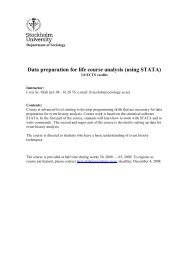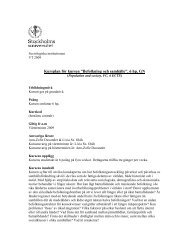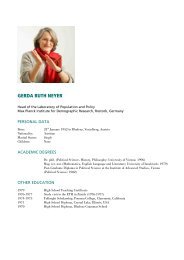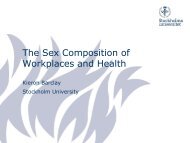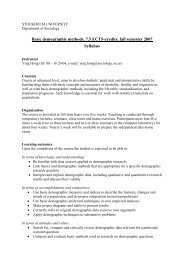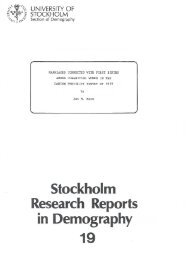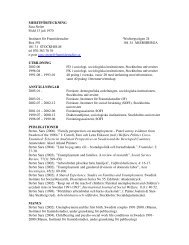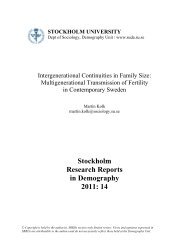Handbook for the Master's Programmes in Demography - SUDA
Handbook for the Master's Programmes in Demography - SUDA
Handbook for the Master's Programmes in Demography - SUDA
You also want an ePaper? Increase the reach of your titles
YUMPU automatically turns print PDFs into web optimized ePapers that Google loves.
venues How are gender relations with<strong>in</strong> <strong>the</strong>se sites be<strong>in</strong>g trans<strong>for</strong>med by chang<strong>in</strong>g policies and<br />
discourses on gender equality and gender equity Are <strong>the</strong>se changes produc<strong>in</strong>g greater differences<br />
among groups of men and women by age, ethnicity, religion, class, sexualities<br />
The purpose of <strong>the</strong> course is to provide <strong>the</strong>oretical and empirical tools to assess <strong>the</strong> cont<strong>in</strong>uities and<br />
discont<strong>in</strong>uities <strong>in</strong> gender relations <strong>in</strong> advanced <strong>in</strong>dustrialized societies. The course aims to extend <strong>the</strong><br />
knowledge base of gender <strong>in</strong> <strong>the</strong> social sciences; build<strong>in</strong>g upon <strong>the</strong> new research that recognizes<br />
gender as a dynamic and contested research terra<strong>in</strong> across different sites and with<strong>in</strong> diverse groups.<br />
The course offers a range of approaches and perspectives <strong>for</strong> analyz<strong>in</strong>g gender consider<strong>in</strong>g different<br />
spheres of do<strong>in</strong>g gender: work, family, politics, sexuality, and ethnic/gender conflict <strong>in</strong> communities,<br />
global tourism. The course will focus on both lived experiences (how men and women do gender) as<br />
well as how actors <strong>in</strong> different policymak<strong>in</strong>g arenas frame and apply gender, <strong>in</strong> global, EU, national<br />
and local contexts.<br />
Family dynamics <strong>in</strong> a chang<strong>in</strong>g Europe<br />
7.5 ECTS) credits<br />
This course offers an <strong>in</strong>troduction to contemporary research on fertility and family dynamics <strong>in</strong><br />
Europe. It provides an overview of recent <strong>the</strong>ory and research on changes and dynamics <strong>in</strong> family<br />
demographic behavior <strong>in</strong> Europe. With its variation <strong>in</strong> cultural, political, economic, and <strong>in</strong>stitutional<br />
sett<strong>in</strong>gs, Europe is <strong>the</strong> ideal place to test various hypo<strong>the</strong>ses on <strong>the</strong> causes and consequences of<br />
family demographic change <strong>in</strong> economically developed societies. The recent trans<strong>for</strong>mation of<br />
Central and Eastern Europe, and <strong>the</strong> <strong>in</strong>creas<strong>in</strong>g importance of <strong>in</strong>ternational migration have added to<br />
<strong>the</strong> variety of demographic dynamics of <strong>the</strong> cont<strong>in</strong>ent. The sem<strong>in</strong>ar will cover changes <strong>in</strong> liv<strong>in</strong>g<br />
arrangements and union dynamics; changes <strong>in</strong> childbear<strong>in</strong>g dynamics; causes and consequences of<br />
family-demographic change; relationships between social and economic policy and familydemographic<br />
change; and transnational vital events and family dynamics <strong>in</strong> <strong>the</strong> course of<br />
<strong>in</strong>ternational migration. Particular attention will be devoted to comparative research with<strong>in</strong> Europe<br />
and to <strong>the</strong>oretically <strong>in</strong><strong>for</strong>mative comparisons with low fertility sett<strong>in</strong>gs <strong>in</strong> o<strong>the</strong>r developed countries.<br />
The course consists of lectures and discussion of course contents by course participants. Exam<strong>in</strong>ation<br />
is done by means of active participation <strong>in</strong> discussion of lecture contents and by present<strong>in</strong>g an<br />
<strong>in</strong>dependent course paper.<br />
Advanced demographic methods II: Fur<strong>the</strong>r Topics and an Empirical Project <strong>in</strong> Event-<br />
History Analysis<br />
7.5 ECTS credits<br />
In this Master’s / PhD level course, students will learn how to apply event-history techniques to<br />
duration data. The course is a cont<strong>in</strong>uation of “Advanced Demographic Methods 2: An Introduction<br />
to Event-History Analysis” and provides fur<strong>the</strong>r knowledge of topics such as different parametric<br />
models, Cox regression models, discrete-time models, selection issues, repeated events, and<br />
compet<strong>in</strong>g risks. Throughout <strong>the</strong> course students will apply event-history techniques to own research<br />
projects.



